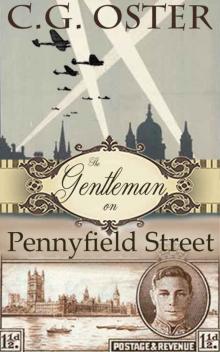- Home
- C. G Oster
The Summerfield Bride
The Summerfield Bride Read online
By C.G. Oster
Copyright ©2019 Camille Oster
All rights reserved.
This is a work of fiction. Names, characters, places, and incidents are the work of the author's imagination, or are used fictitiously, and any resemblance to actual persons, living or dead, business establishments, locales, or events is entirely coincidental.
Chapter 1
London, July 1945
VICTORIA STATION WAS a sea of green. Men in uniforms as far as the eye could see, interspersed with nervous and anxious women, waiting for husbands, fathers, brothers and sons coming in on the train approaching in the distance. One train had arrived a few minutes earlier and the occupants were now being united with the loved ones that some of them had perhaps never expected to see again.
Dory fiddled with her hair under her hat, the pins tugging her scalp as she did. It had been an age since she looked so nice, dressed in a skirt and jacket, but there wasn’t hosiery in London for love nor money. The end of the war hadn’t fixed that.
The distant train was drawing closer and closer, pushing forward through its own billowing steam. Biting her nail, she waited. Hopefully Captain Ridley was on this one. When he’d called, he’d said he would be, but it was mayhem everywhere just now. All of London was chaos. Soldiers had been arriving back all week, and the merrymaking was in high form every night.
A groan escaped her as someone bumped into her, hastily mumbling their pardon and Dory returned to torturing her nail. For her, the end of the war would not truly feel real until Ridley was back.
Victory had arrived and it had come both as a surprise and not. Had been a long time coming, and even longer predicted. At first, Dory hadn’t believed it when a young man had run out of the brick canal-side buildings near Berkhempshire to yell to her that there had been victory. She’d been guiding down one of the coal barges from up north at the time, and the raucous cheering when she’d passed a pub had confirmed that it was true. The war was over.
Now, the pervasive coal smudges had been scrubbed away and she was as clean as she had ever been in the last six months.
The train was slowing, the wheels squealing as the breaks were applied. Dozens of heads leaned out the windows, searching for their loved ones, smiling and calling. Not Ridley. It wouldn’t be something he did.
The doors to the compartments all opened before the train stopped and men streamed out, carrying their bags over their shoulders and some with their hats rolled up under their epaulets. These were the lucky ones, the ones that had survived intact. No one had escaped seeing injured soldiers, missing arms and legs, and at times with bandaged heads and faces. A fresh level of reality added to this blasted war.
But it was over now and there was a future to think of. It was hard to imagine it, though. Peace. What did it mean? Would they go back to the way things had been before? Dory couldn’t imagine. She wasn’t the person she had been before—barely more than a girl at the time. Girlhood things seemed too distant now.
Endless soldiers passed and still there was no sight of him. The sounds of pouring hearts surrounded her and it was hard to listen to. Dory kept looking ahead, fighting despondency as the stream started lessening, and then there he was. His brown hair was cut short and he looked down as he walked. Her heart contracted painfully with both joy and relief. He wasn’t the same man who had left either. Neither of them were the same.
A smile spread across his lips as he saw her. Dory was simply allowing herself to watch him. For so long, he had been an image in her head. She hadn’t even had a photo of him. There was one in the library in an old edition of The Times, where his photo had been displayed in relation to a case he’d investigated. She’d known it was there, but she hadn’t gone to look at it.
“Dory,” he said as he approached. She smiled and stepped toward him, wrapping her arms around his neck. It felt so nice to have him home, to feel him being real and solid. He held her tightly for a moment and then let go.
Dory stepped back. He wanted to leave, which she understood. Probably eager to get home after so long. “How was your journey?” Was that a silly question after everything that had happened? What else could she ask? How his war had been?
“Crowded and hot,” he said, picking up the bag he had dropped and they walked through the crowd of the station. Behind him, the train was already departing, going back unoccupied for another load of returning soldiers. A murmur of voices echoed off the cavernous space of the station and eventually they got out onto the busy street. The line for a cab was long and would probably take an hour or two to clear, and as his house was close by, they walked.
There was some damage in Pimlico, but nothing near the mess of the East End. But his apartment was fine. She’d passed occasionally to check on it if she’d been in the area.
“When must you return to work?” he asked.
“I’m not. The man who owns the narrowboat I was working came back and I am no longer required.” It had been an awkward meeting coming into Birmingham and that sullen man had been waiting. Wasn’t much for talking, but said he’d be taking his boat back. She hadn’t been prepared and had to quickly clear her things out. If the vessel had been released from duty, she didn’t know, but he did own the boat, so she couldn’t rightly argue with him. So she had ended up standing on the dock as he’d sailed away, not even looking back.
Apparently he had come from an extensive family of boat people, because at times, people had called for him when they’d seen the boat coming.
“No more coal,” she said and smiled. No more black soot that got everywhere. Before long, she had stopped fighting it and just accepted that black smudges were unavoidable. “I suppose I will have to find another job,” she said after a moment. “Are you returning to work?”
“With the Met?” he asked. “Yes, I suppose so.”
The trees were in full bloom, the leaves rustling in the gentle breeze. People were out on the streets, more enjoying themselves than working. They deserved it after such long years of hardship—all of them did. Interspersed with the sadness of the ones who weren’t coming home.
They reached Ridley’s building and walked up the stone stairs, their feet echoing off the internal staircase. The apartment was still and silent as they walked in. It was exactly as she remembered. Quite modern and elegant compared to what she was used to. It had been refurbished a decade back, she would guess.
She smiled as Ridley dropped his bag. “Welcome home,” she said.
“Where are you staying?”
“In Swanley, with my mother,” she replied. “There isn’t a place to be had in London at the moment. So many are without homes as it is.”
He remained silent for a while and it grew awkward between them, even as she was so very happy he was home.
“Shall we go for a drink?” he suggested. “There’s a pub the next street over. One of the things I have missed is just sitting in the pub with a pint.”
“Brilliant idea.”
They left the apartment and walked down the long stairs. It didn’t take long to reach the pub, which was raucously crowded, even as it was quite early in the day. A number of uniforms were seen, but that was not unusual as soldiers had intermittently returned throughout the war. But now they were returning for good and Dory expected the uniforms would start disappearing before long, replaced by civilian clothes.
“So how have you been?” Ridley asked as he returned with two pints to the small table in the corner where they had to squeeze in.
“Surprisingly peaceful,” she replied. Was that the wrong word to use under the circumstances? “Life on the canals is slow and uneventful. Just glide along the water day in and day out. If not for the soot, I would say it was very nice.” Compared
to the constant bombardment and tension manning the searchlight in Limestone, it had been serenely calm. The bombings had eventually died down and the need for searchlights had lessened, so she’d been moved to work the canals.
Coal was crucial in keeping the country running, and she had been given one of the motorized boats, so she could worked alone, while many were still horse-drawn, requiring two girls, one to lead the horse and one to steer. Those poor girls had to take turns walking back and forth across most of England.
Taking a deep sip, Dory enjoyed the ale. There was singing somewhere in the pub and everyone joined in. Dory hoped Ridley was having a lovely time. He deserved it after everything he’d been through. Not that he’d told her anything. He never wished to speak of the things he’d seen and done, and she suspected that wasn’t going to change now.
Chapter 2
THEY STAYED OUT UNTIL past dark, where they ate dull roast lamb and potatoes at one of the canteens. Dory suspected there was no salt at all in the meal, but one could not complain about such things. Salt was used when salt was available. There was no point in complaining.
Ridley didn’t seem to mind.
Beside them, a man was talking about how dreadful the conditions were on the continent. Starvation, the man had said. “People dying in the streets from sheer exhaustion,” he continued.
Dory wanted to ask if that was true, but the tight look on Ridley’s face made her hold her tongue. Little was being reported about such things in the papers. Right now, it was all about victory and our valiant soldiers. But throughout the war, the papers had hidden the worst of what was happening, and exaggerating the victories they’d had. Everyone knew this. Perhaps it had been necessary. Things were too hard as it was, to also take on other people’s misery as well. One had simply learned to block out the hardship of one’s own and everyone else’s.
“And what of Lady Pettifer?” Ridley asked. “Have you heard from her?”
“I understand she is currently back as Wallisford Hall for the summer. She has invited me to come visit.” Dory didn’t know exactly why she said that, and she didn’t really want to visit that place, even as most of the people she’d known when she’d been working there were gone. “Maybe I will make a day trip sometime.”
“No reason you can’t.”
Except she now had no job and no longer had a salary. So it would be something she would have to consider once she had a new job.
“Are you finished?” he asked as she put her knife and fork down. She nodded. “Let’s get out of here.”
Dory suspected he didn’t want to sit there and listen to any more of their neighbor’s shocked observations from the continent. “Let’s walk a little.”
It was cool outside, but not cold. The gas lights had been lit and they could stroll quite freely. It was difficult not to listen for the air raid sirens. Towards the end of the war, they had returned intermittently, but not as often as at the beginning, when the Germans had held their continued campaign of bombardment.
The Thames peeked through the buildings ahead and they walked towards it, Dory checking her watch intermittently. The trains ran late at the moment, but she couldn’t afford to miss it, or she would be sleeping in the train station with so many others. But she had time.
Threading her arm through his, they walked slowly. “It will be a mad summer, I think,” she said with a smile.
“Everyone will want a bit of fun after the period that has been.”
“Do you think things will go back to how they were before?” she asked.
“No, I don’t think so. Too much has changed.”
She certainly didn’t wish to be treated as she had been before, being only employable as a secretary or a domestic servant. The one thing she did know was that she could take on just about any job there was, and she could do it just as well as a man.
They passed a group of drunk American soldiers. They were a common sight too, enjoying time away from the war, and now the end of the war.
“They’ll start heading home too,” Ridley said as they’d walked past.
“As eager as everyone else to get home.”
“It is the people we miss more than the places,” he said. “Your relationship with the people you know, past and present, changes. There’s something to be said for the places you know, the familiar streets and sights, but it’s the people with which your heart is aligned.”
Trying to understand his sentiment, Dory simply listened. It wasn’t often Ridley talked about what he felt, so she let him say what he wished to convey.
“Your friendship was very important to me throughout these years,” he continued. “And it was you I wanted to see when I came home.”
A smile toyed on her lips. It was sweet. He’d never said something like this to her before. Normally, he was mostly very practical, at times warning her to be careful. That was sweet too, in its own way.
They walked toward the Embankment. Parliament still had its bomb damage, but there was evidence of work being done to remedy it. Already the city was starting to repair itself, but there was so much damage.
“Well, I was very glad to see you on the platform today,” she said. “I worried for you. And my brother.” Even Vivian, whom no one had heard from. The silence was the worst thing. He could well be dead. Dreadful things had been heard from the few that had escaped from Singapore. It was hard to imagine him dead. So full of life. Thorny at the best of times, but…
She didn’t want to think about it anymore. Being subject to Lady Pettifer’s worry about him was difficult.
But for tonight, she simply wanted to celebrate Ridley’s return, so she pushed such dark thoughts away. It was not the night for dark thoughts.
The lights of the city were blazing bright. For so long, the city had been dark, but not now. It was as if every light in the city had been turned on so the city sparkled. The dark also hid the damage. It was easier to forget at night.
The water of the Thames was inky black as it flowed. She couldn’t tell which direction. The skies were cloudy and absent of stars—the kind of nights they used to fear because the Dorniers, Fockes and Junkers would come.
A chill ran through her.
“Are you cold?” Ridley asked.
“No, not terribly,” she said. Her wool skirt and jacket were warm enough. “Just memories.”
“We all have those.”
Dory checked her watch again.
“What time do you need to go?”
“Not for a while yet,” she said with a smile.
They sat down on one of the cast iron benches. Beside them, the shadows highlighted the shrapnel damage in the stone walls of the Embankment. She wasn’t sure how that would ever be fixed. Perhaps it wouldn’t. Some scars on the city would likely remain forever.
“Thank you for coming to see me,” he said, looking out across the water.
“Of course I would come to see you. You are my dearest friend.”
“You don’t have to return to Swanley tonight, if you don’t want to.”
For a moment, Dory wasn’t entirely sure what to say. It wasn’t as if she doubted that Ridley wouldn’t be a complete gentleman if she stayed in his apartment for the night, she just hadn’t anticipated staying. And there wasn’t any particular reason why she would stay there. They had no specific plans for the following day. Although it was understandable if he wanted to spend the day with a friend.
It would be frowned upon, even if things weren’t quite as they’d used to be. Rules of etiquette had taken a backseat when so many lives had been at stake. Girls didn’t much bat an eyelid if someone said they had spent the night with their sweetheart while back on leave. So it wasn’t harm to her reputation that she feared—although Lady Pettifer would deeply disapprove, but she was of a completely different generation.
“I’m not sure…” Dory started. Because the truth was that she wasn’t sure. There was a risk to her heart here, and she certainly didn’t want to put either of them in a situa
tion where things became awkward and painful. The truth was that she wanted to kiss him, not to hold herself back because she knew they would be alone in his apartment later. She didn’t want them to simply be friends.
“Would you feel differently if we were engaged?”
The startling words pierced through her mind. What had he just said? “Engaged?” she repeated.
“Will you marry me, Dory?” he asked. “It is you I have been wishing to see for years now, and now that we are both here, I don’t want to be without you.”
Dory blinked. “You wish to marry me?”
“Yes,” he said with a smile. “I think I have been thinking for quite a while that if I made it back, I would marry you.”
“Oh Michael,” she said and kissed him. “Truly?”
“Yes, truly,” he replied. “I don’t have a ring, I’m afraid. We will have to pick one out.”
Dory didn’t care about a ring. She was still so utterly stunned. Obviously, she’d dreamed of Ridley wanting to marry her, but she hadn’t expected it. Her eyes shifted back and forth, searching his. He was so beautiful when he smiled, and he looked happy. This made him happy?
“You’re going to actually have to say yes. Or no, if that is your answer.”
“Yes, of course I will.”
With that, he drew her into his lap and they kissed properly—the way she wanted him to kiss her. They were engaged. They were going to be together—married. It was more than she had dared hope for.
Chapter 3
STANDING IN THE RED telephone box off the side of the Swanley village square, Dory waited for the operator to put her through to Wallisford Hall. The occasion called for it.
By the cool reserve of the ‘hello’, she knew it was Mr. Holmes, the family butler. “Hello, Mr. Holmes. It’s Dory—Miss Sparks, I mean.” It occurred to her that she wouldn’t be Miss Sparks all that much longer, and would in the future be Mrs. Ridley. A frisson of excitement and incredulity ran through her. “Would you be so kind as to tell Lady Pettifer that I am calling.”

 The Summerfield Bride
The Summerfield Bride Secrets at Wallisford Hall
Secrets at Wallisford Hall The Gentleman on Pennyfield Street
The Gentleman on Pennyfield Street Mischief in St. Tropez
Mischief in St. Tropez